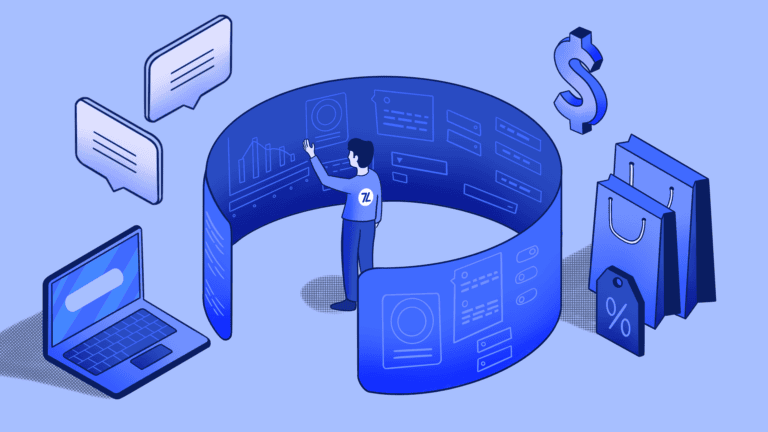The concept of composable commerce is leading to a wave of transformation across multiple industries, as organizations move away from their traditional, monolithic IT structures in favor of a modular, more flexible approach. This modular approach is something we at 7Learnings have adopted early on in our development, and enables our clients to benefit from our best-of-breed approach to retail pricing.
What is composable commerce?
Composable commerce is a term used to describe a development approach that involves selecting best-of-breed commerce components and ‘composing’ these elements into a custom application built for specific business use cases. This concept has been spearheaded by the MACH Alliance which stands for Microservices, API-first, Cloud-native, and Headless.
Adopting composable commerce allows businesses to break down their monolithic systems into smaller, independent components, enabling them to swiftly adapt to changing market trends and customer needs.
Key features of composable commerce include:
- Modularity: The architecture is broken down into decoupled modules or microservices, allowing businesses to swap, upgrade, or add components without affecting the entire system.
- Flexibility: Companies can select from best-in-class solutions for each specific functionality.
- Scalability: A modular approach allows businesses to scale individual components independently, optimizing resources based on the business needs.
- Agility: Composable commerce enables quicker adaptation to market changes, as businesses can integrate new technologies or services rapidly without rebuilding the entire platform.
- Personalization: The ability to pick and choose different services allows businesses to craft a more personalized experience.
- API-first: APIs play a central role in composable commerce, as they facilitate seamless communication between various services.
The benefits of predictive pricing in a composable commerce ecosystem
Retail pricing is becoming increasingly dynamic, as retailers must contend with numerous challenges; post-corona correction in the market, aggressive competition (particularly from China), cost increases, supply chain issues, to name a few. Striking the right balance between competitive pricing and maintaining profit margins can be challenging for businesses of all sizes. This is where predictive pricing comes in, acting as a critical component of a composable commerce ecosystem.
Read on: Price optimization with machine learning: what every retailer should know
Real-time market insights
We use advanced machine learning algorithms to analyze real-time market data, competitor pricing, historical sales, and customer behavior. By doing so, we give our clients valuable insights into market trends, enabling them to make data-driven pricing decisions.
Dynamic pricing
Composable Commerce allows businesses to seamlessly integrate Predictive Pricing SaaS into their existing e-commerce architecture. This empowers them to implement dynamic pricing strategies, automatically adjusting prices in response to changing market conditions. As a result, businesses can optimize revenue and profit margins while ensuring customers receive fair and competitive pricing.
Forecasting & inventory management
The predictive capabilities of our solution extend beyond pricing. Businesses can also leverage forecasting algorithms to anticipate demand fluctuations and optimize inventory management. By avoiding stockouts and overstock situations, companies can efficiently allocate resources and minimize carrying costs.
Competitive advantage
In the highly competitive e-commerce landscape, the ability to react swiftly to market changes and customer demands is paramount. By combining composable commerce and predictive pricing, businesses can stay agile and gain a competitive edge over rivals trapped in traditional monolithic systems.
How 7Learnings fits the composable commerce framework
Our predictive pricing solution has been developed in line with the principles outlined in the MACH Alliance‘s Composable Commerce framework. Here’s how our solution complements the principles of Composable Commerce:
Microservices architecture
Our predictive pricing solution is built around a microservices architecture. This enables us to develop each microservice individually and fast. As an example we don’t have one monolith forecast, but forecast cost and returns separately in modules. Also our optimizer is one microservice that can be developed independently from other modules.
API-first approach
As an API-first platform, our software is easily integrable and communicates smoothly with the other components found in a composable commerce ecosystem. This enables businesses to easily plug our solution into their existing stack without disrupting other services.
Cloud-native scalability
Embracing cloud-native infrastructure ensures that our predictive pricing solution can handle high volumes of data and computations, guaranteeing a seamless user experience for businesses of all sizes, even during peak traffic. By partnering with MACH member Google Cloud we have found the ideal partner for our highly scalable AI solution.
Headless flexibility
Our own solution follows headless principles in that retailers can use it for predictions only, for optimizing prices or for optimizing marketing spend.

Innovating retail pricing
As the retail landscape continues to evolve, businesses must embrace innovative solutions that allow them to stay agile, adapt to market changes, and deliver exceptional customer experiences. Composable commerce represents the very best way for businesses to build and maintain their digital infrastructure, and 7Learnings is proud to have fully embraced this concept. Using the power of predictive pricing within a composable commerce ecosystem, businesses can position themselves to thrive in this dynamic marketplace.



